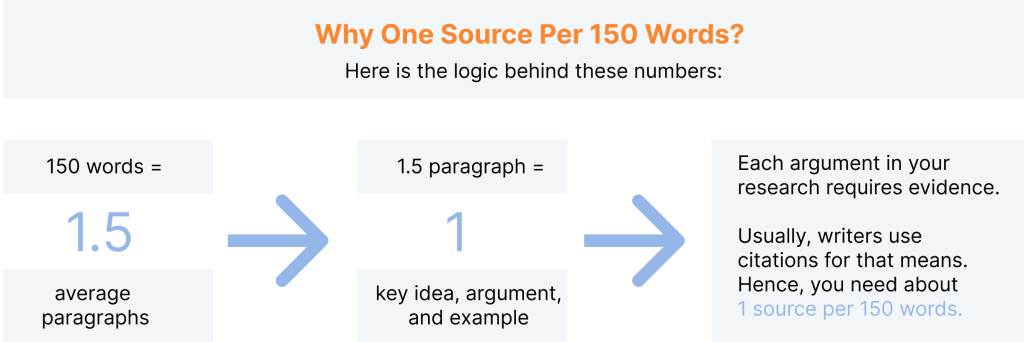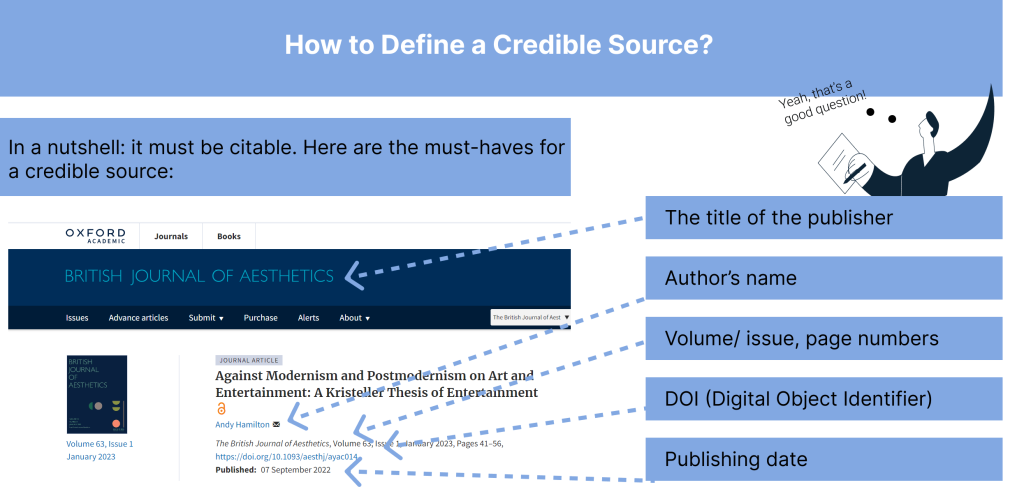Writing a research paper involves not only the collection and analysis of information but also the proper citation of sources to support your arguments and ideas. A common research question often arises during writing: “How many references should I have?” The answer to this question depends on various factors, including the length of your paper, your research, and the specific requirements of your assignment or publication.
Here, we will break down this question, provide a rule of thumb for reference count based on the paper’s length, and offer some general tips on referencing. Additionally, we will introduce a helpful tool, the Reference Finder, to simplify finding and formatting your references. Balancing the number of references can be a challenge in academic writing; the question of how many references should I have and how many references are enough often depends on the paper’s length and complexity.
How Many References Should You Have in Your Paper? Specific Numbers Included
The ideal number of references for a research paper can vary significantly based on the type of paper you are writing and its intended audience. To determine how many sources should a research paper have, consider the following factors:
- Paper length
One of the primary determinants of the number of references you should have is the length of your research paper. As a general rule of thumb, you should aim for one source for your paper’s reference list per 150 words. Here’s a breakdown by essay size:
- 1500-word essay: Aim for at least 10 sources in the reference list.
- 2000-word essay: Aim for at least 13 sources in the reference list.
- 3000-word essay: Aim for at least 20 sources in the reference list.
- 5000-word essay: Aim for at least 33 sources in the reference list.
Keep in mind that these numbers are general guidelines, and you should always check your specific assignment requirements or the guidelines of the publication you are submitting to for any variations.

- Type of research
The nature of your research can also influence the number of references needed. For empirical research papers, you may need more references to support your findings and methods. On the other hand, theoretical or conceptual papers may require fewer references since they focus on synthesizing existing theories and concepts.
- Research depth
Consider the depth of your research. If you are conducting an in-depth study on a complex topic, you may need to include more references getting the breadth of your knowledge and provide a robust foundation for your arguments.
- Assignment requirements
Always check the specific requirements provided by your instructor or the publication you are submitting to. An application may specify a minimum or maximum number of references you should include.
Determining the Right Balance: How Many Sources Should a Research Paper Have?
The number of sources in a research paper is a critical aspect that can significantly impact the quality and credibility of your work. Striking the right balance between the number of references is important to ensure your paper is well-supported without overwhelming your readers. Here, we delve deeper into understanding how many references should a research paper have:
- Scope and complexity of the topic. The complexity and breadth of your research topic play a pivotal role in determining the number of sources. For instance, if you are writing a concise essay on a straightforward subject, you may only need a handful of well-chosen references. On the other hand, a comprehensive study on a complex, multi-faceted issue may require a more extensive list of sources to encompass all aspects adequately.
- Supporting different perspectives. Including various sources can strengthen your paper by showcasing different viewpoints and arguments related to your topic. This diversity of perspectives demonstrates a well-rounded understanding and thorough research effort. For example, if you are writing about climate change, you might reference scientists, policymakers, and activists to present a comprehensive overview.
- Research depth. Your paper’s depth is a crucial factor. You may need more sources if you aim to provide an in-depth analysis or discuss a specialized niche within your field. For instance, a Ph.D. thesis exploring a niche area of astrophysics may require many references to cover the extensive body of knowledge within that domain.
- Publication requirements. Always ask the specific requirements of the publication or assignment you are working on. Some journals or academic institutions may have guidelines on the minimum or maximum number of sources you should include. Adhering to these requirements ensures your work aligns with the intended audience’s expectations.
- Peer-reviewed sources. Confirm the use of peer-reviewed sources when applicable. These sources are typically considered more reliable and credible in academic writing, adding weight to your arguments.
“Science,” one of the most popular and credible journals, requires about 50 references per 2000-3000 words.
Tips: How Many References Are Appropriate?
How many sources should be used in a research paper depends on the context and character of your research. In some fields, such as scientific research, it is common to have a substantial number of references to demonstrate the depth of the literature review and the reliability of the research. However, a smaller number of carefully chosen references may be more appropriate in other fields, such as literature or philosophy.
So, how many references is too many?
Do you know how many references is too many? While it is crucial to have enough references to support your paper’s content, there is also the potential to have too many references. Excessive citations can make your paper appear cluttered and may distract readers from your main arguments. Moreover, relying heavily on references without providing your analysis or insights may suggest a lack of critical thinking.
A good rule of thumb is to avoid mistakes or unnecessary repetition of sources. If multiple sources convey the same information or perspective, citing one or two to represent that viewpoint is generally sufficient.
And how many references are enough?
On the other hand, having too few references can weaken the credibility of your paper. Insufficient references may give the impression that your research is not well-grounded in existing literature, which can impact the overall quality of your work.
To determine if you have enough references, consider the following questions:
- Have you covered the key literature related to your research topic?
- Have you cited authoritative and reputable sources?
- Have you included references to support each major point or argument in your paper?
If you can answer “yes” to these questions, you likely know how many references should you have.
Recommended reads
Even More Tips on How Many References Should You Have
General tips on referencing
Now that we have discussed how to determine how many references are appropriate, let’s explore some general tips on referencing in your research paper:
- Use credible sources
Ensure that the sources you cite are from reliable and reputable publications. Academic journals, books from established publishers, and government reports are typically considered credible sources. Avoid using sources from questionable websites or unverified sources.
- Cite recent sources
In many fields, it is essential to include recent research to demonstrate that you are up-to-date with the latest developments in your field. However, this may vary depending on the topic and the nature of your research.
- Diversify your sources
Include a variety of source types, such as academic articles, books, reports, and primary sources when applicable. Diversifying your sources demonstrates a comprehensive understanding of the topic.
- Follow citation style guidelines
Adhere to the citation style specified by your instructor or the publication you are submitting to. Common citation styles include APA, MLA, Chicago, and Harvard. Consistency in citation style is crucial for the readability and professionalism of your paper.
- Avoid plagiarism
Properly cite all sources to avoid plagiarism. Plagiarism is a serious academic offense and can have severe consequences. Always attribute ideas, data, and words to their original sources.
- Use reference management tools
Use reference management software like EndNote, Mendeley, or Zotero to organize and format your references automatically. These tools can save you time and help you maintain the right experience and qualifications in your citations.

Exploring the Reference Finder: A Powerful Tool for Research Paper References
In the digital age, finding the right sources for your research paper has become more accessible than ever. One invaluable tool that can streamline this process is the Reference Finder. In this section, we will delve into its capabilities and how it can revolutionize your research paper referencing.
- What is the reference finder?
The Reference Finder is a tool provided by the CustomWritings.com company, designed exclusively to work with scientific articles, books, and research materials from reputable sources. Its primary objective is to simplify the referencing process for researchers, students, and people alike.
- Can a reference finder locate different types of sources?
One common question is whether the Reference Finder can locate various types of sources, such as books, articles, or websites. CustomWritings.com’s Reference Finder focuses exclusively on scientific articles, books, and research materials from reliable sources. It does not discover podcasts or other non-written sources. This specialization makes it ideal for academic research, as written materials are generally preferred for citations in scholarly papers due to their reliability.
- How accurately do reference finder tools retrieve the information?
Accuracy is crucial when it comes to academic research. CustomWritings.com’s Reference Finder ensures that it retrieves the latest, most accurate, and directly related sources for your topic. It harnesses the power of CORE, the world’s largest collection of open-source research papers, constantly growing with new publications from around the globe. It means that the sources you access through this tool are of high quality and scientific actuality.
- Do reference finders support various citation styles (APA, MLA, Chicago, etc.)?
Yes, CustomWritings.com’s Reference Finder supports searching for papers formatted in different citation styles, including APA, MLA, and Chicago. While it can help you find sources, it is not primarily a citation generator. CustomWritings.com offers a separate tool for generating citations effortlessly and in a few clicks. So, contact their managers for more info. Don’t hesitate to begin training on how to do this right.
- Are reference finders free to use, or do they require a subscription?
Good news for users concerned about costs: CustomWritings.com’s Reference Finder is free of charge! You don’t need a subscription to access and use this valuable tool. It’s easily accessible from the webpage and can help you retrieve exciting and reliable sources for your research or resume.
- Who can benefit from employment reference finders? Can reference finders be used by students, researchers, and professionals alike?
Absolutely! Reference Finders are versatile tools that can benefit someone exploring a particular topic. Whether you’re a person working on a research paper, a seasoned researcher, a journalist seeking credible sources, or a speechwriter who looks for valuable content, the Reference Finder can be a valuable asset. Its reliability ensures that all the sources you discover are trustworthy and accurate, making it suitable for various fields and expertise levels.
Incorporating the Reference Finder into your research arsenal can help you expedite the process of finding and formatting references, making your academic and professional hiring more efficient and effective. Now, you know the answer to this question – “How many references should I provide in my research paper to ensure its credibility and depth?” Do you want to know more?
